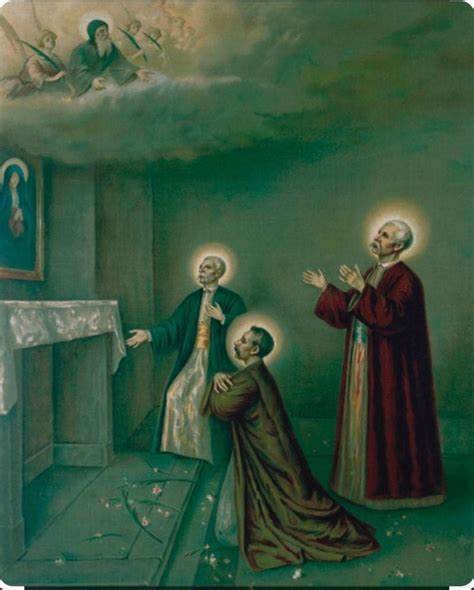The Massabaki brothers will be saints: a Christmas gift to the Maronite Church
Killed during the 1860 massacres on Mount Lebanon and Damascus, they are an example of "martyrs of the faith" at a time of growing persecution, further proof of the importance of the ecumenism of the saints, who died giving their lives for "Christ himself". As John Paul II noted, Christian unity is not to be built, but only to be expanded.
Beirut (AsiaNews) – The Maronite Church has just announced, through the voice of Patriarch Bechara al-Rahi, that Pope Francis has approved the decree proclaiming the brothers Francis, Abdel Moati and Raphael Massabki "martyrs of the faith".
The three men, who died during the infamous Damascus massacres of 1860, will be counted among the saints of the universal Church, regardless of any miracle performed at their intercession. This is a key moment in the canonisation of the future saints.
“This is our Christmas present,” said the head of the Maronite Church, speaking of the honour bestowed upon his community through them. The date of the canonisation ceremony, which is normally celebrated in Rome, has not yet been set.
The Massabki brothers were killed in Damascus during the wave of massacres whose historical causes stem from rivalries in Mount Lebanon between Druze and Maronites, fanned by foreign interference in which the Ottoman governor Ahmed Pasha was one of the key players.
The three men were killed on 10 July 1860 in a Franciscan convent, after refusing to renounce their Christian faith, during a jacquerie (rural uprising) that lasted from 9 to 18 July, which saw the slaughter of 4,000 to 6,000 Christians in Damascus, but also touched the Bekaa Valley, especially Zahle.
During nine days of massacres, nearly 20,000 Christians were murdered in Damascus and the Bekaa. Eleven churches and three convents were destroyed in the Syrian capital, and 1,500 to 2,000 houses and 200 shops were set on fire and some razed to the ground. The Russian, Dutch, Belgian, American and Greek consulates were ransacked and burnt.
Some Muslims rescue the lost honour
Pious Muslims saved the lost honour, including Abdel Kader, the Algerian emir exiled by the France to Damascus, thanks to whom many Christians were saved and able to reach safety in other regions of Lebanon.
Coming full circle, news of the massacres perpetrated in 1860 horrified the West that saw itself as the protector of Eastern Christians. The approaches by Western powers to the Sublime Porte had the desired effect.
Ahmed Pasha was executed, along with other imperial officials who had been involved in the massacres, and hundreds of accomplices were imprisoned or exiled.
In 1926, some 66 years after the massacres, in a joint move by the Apostolic Nuncio in Damascus and the Maronite Archbishop of Damascus, Bishop Bechara Chémali (whose territory extended to Sarba, Lebanon), the three Massabki brothers were declared Blessed by Pope Pius XI (7 October 1926), at the same time as the martyred Franciscan friars. Since then, the Maronite Church celebrates the blessed Massabki brothers on the Sunday following 12 July each year.
Ecumenism of the martyrs
Today, in the spirit of unity promoted by Saint Pope John Paul II and perpetuated by his successors, some are saying that the ceremony of canonisation of the blessed will be an opportunity to better highlight "the ecumenism of martyrs".
The victims of the 1860 massacres include Joseph (Youssef) Mehanna-Haddad, a priest of the Orthodox Church of Antioch. He used to leave his house incognito, at the same time as his daughter-in-law (all Orthodox priests are married), but was recognised by rioters, seized and killed. His memory is solemnly commemorated by his Church.
Until now, the Latin, Maronite and Orthodox Churches commemorated the memory of the martyrs of 1860 independently of each other; however, we must realise that these Christians of different confessions bore witness with their lives for the same Christ.
What John Paul II meant, certain Church circles say in essence, is that Christian unity need not to be sought, need not be achieved as if it did not exist, but has to be expanded, for it is already realised in the martyrs and saints of the various Churches who bore witness to their faith, going so far as to gift their life.
08/05/2008







.png)











